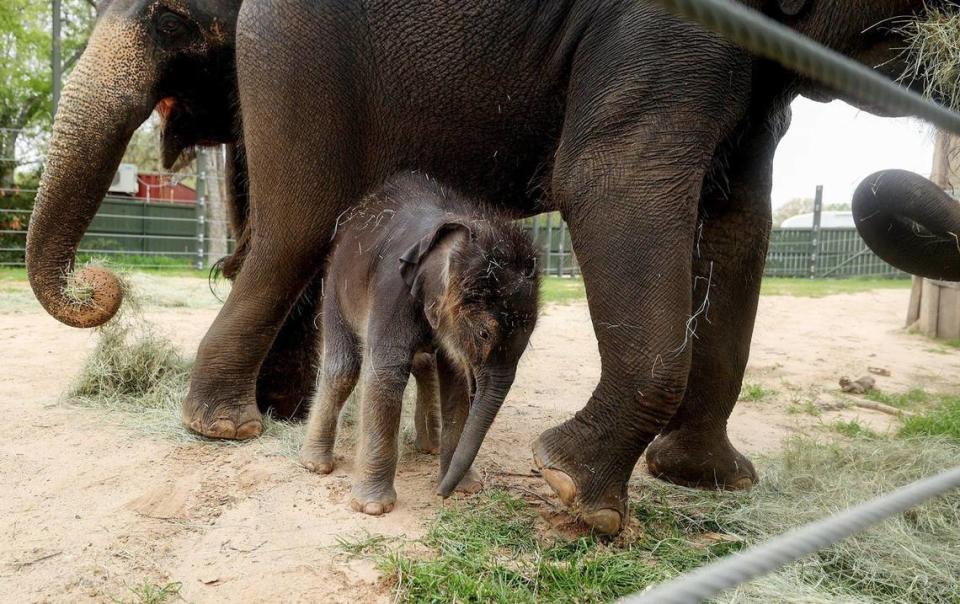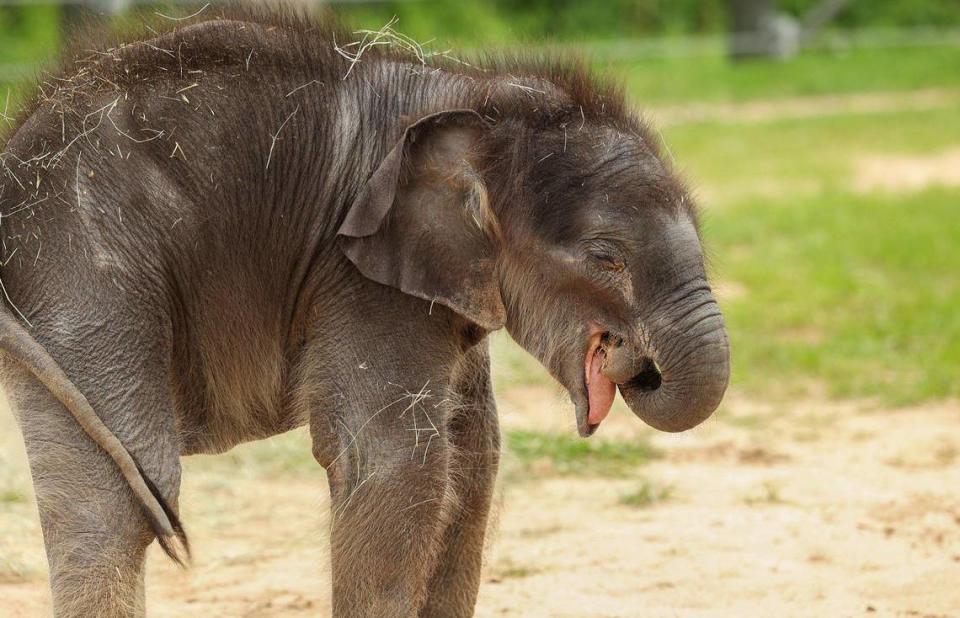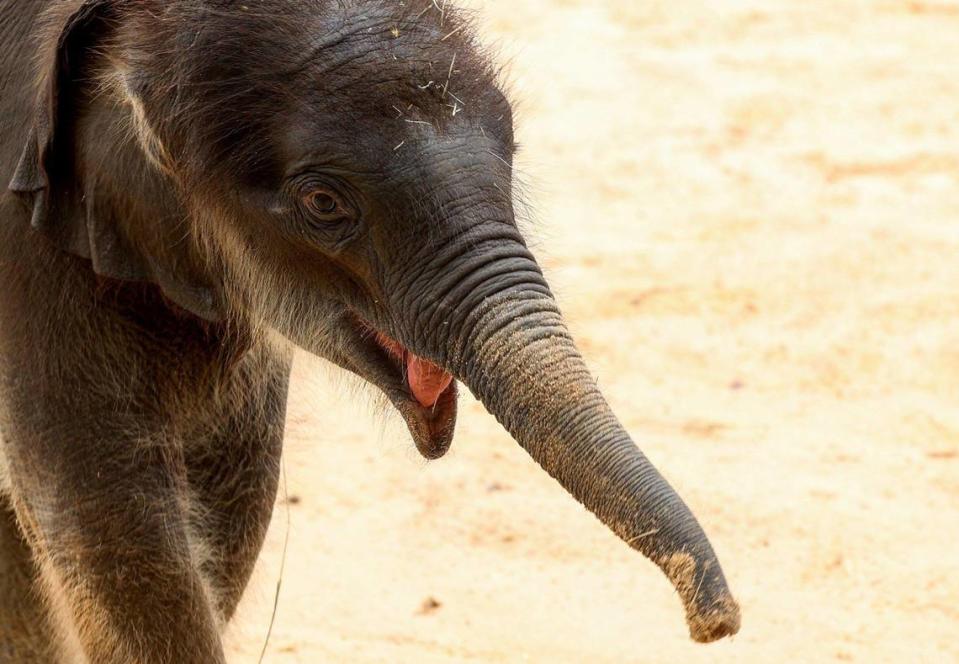With 3 generations of Asian elephants, Fort Worth Zoo invests in survival of the species
Christine Del Turco stands behind the thick steel cables surrounding an Asian elephant yard at the Fort Worth Zoo and scratches the newest member of the herd on the tongue.
The baby elephant, Travis, seems to like the trainer’s attention. Travis’ mother, Belle, stands close by, her trunk nearly touching his rope-like tail. The two have been inseparable since Travis was born Feb. 23. Grandmother Rasha watches the pair from a few feet away — the proud matriarch of the zoo’s three-generation Asian elephant herd.
Visitors to Elephant Springs, the zoo’s Asian elephant habitat, can interact with the animals at a distance by spraying streams of water into a 400,000-gallon river and see them swim and roam the grassy terrain. What visitors don’t see is the work going on behind the scenes to ensure Asian elephants thrive for generations to come.
“At a time when many institutions are getting rid of elephants, we’re doubling down on our commitment to the survival of the species,” Avery Elander, the Fort Worth Zoo’s director of marketing and public relations, told the Star-Telegram.
The zoo welcomed its first elephant, Queen Tut, in 1923. Fort Worth residents donated $3,500 so the city’s Parks Department could buy the 3-year-old Asian elephant. The zoo currently houses four female elephants and four male elephants, including Travis and his 1-year-old half-brother Brazos.

The population of Asian elephants in the wild continues to decline, and they are classified as endangered on the International Union for Conservation of Nature’s Red List.
Today there are only around 50,000 left in the wild, according to the World Wildlife Fund. African elephants are targeted for their ivory tusks and are also in decline, with around 400,000 left in the wild.
Michael Fouraker, executive director of the Fort Worth Zoo and founding president of the International Elephant Foundation, said habitat loss and human-elephant conflict are major drivers behind the reduction of the Asian elephant population.
“The habitat is much broader in Africa,” he said. “In Asia it’s divided up as the different countries.”
Asian elephants used to roam most of the continent, according to the World Wildlife Fund. Now the population is fragmented across 15% of their original range.

The number of elephants in zoos has also declined. Fouraker said many zoos shied away from keeping males because they are more destructive and harder to maintain than females. Now zoo elephant populations are aging out with no offspring to replace them.
“That’s big picture zoos as a whole,” Fouraker said. “We have ... elephants that are coming up in age and we will have elephants well into the future because we have young females coming up. But not all zoos were doing that.”
The Fort Worth Zoo launched an Asian elephant breeding program in 1986, and under Fouraker’s leadership spearheaded a conservation organization known as the International Elephant Foundation in 1998.
Travis is the fifth Asian elephant calf born at the Fort Worth Zoo. His aunt Bluebonnet, born in 1998, was the first. Travis’ cousin Bowie was born in Fort Worth but was recently sent to the Oklahoma City Zoo to help grow the herd there.
“Just like he would in the wild, he is going on to another group where he can go on to hopefully create genetically diverse and healthy baby elephants,” Elander said.
Elander said Bowie is the first Asian elephant born at the Fort Worth Zoo to be sent to another herd.

Fouraker said the zoo’s elephants give researchers a chance to study them and learn how to better help their counterparts in the wild.
“A lot of what we do in zoos is then applied to the wild,” he said.
For example, the herd is closely monitored for elephant endotheliotropic herpesviruses, a highly fatal disease that affects Asian elephants between the ages of 1 and 8. Researchers used to think the virus only affected elephants in captivity, Fouraker said, but have since learned it is also responsible for killing elephants in the wild. Work on a vaccine is underway to protect elephants from this disease.
The elephant trainer Del Turco said the staff is focused on early EEHV detection. They teach the young elephants to blow a harmonica as a way of getting air from their trunk into a bag, which is then tested for EEHV levels.
“It’s a cute behavior, but it’s also very practical as well in their overall training for their health,” she said.
Del Turco said the elephants also have their blood drawn every month to check for vitamin deficiencies. The nutrition department prepares a diet to meet each individual elephant’s needs.

There’s room for about 16 Asian elephants at the Fort Worth Zoo, according to Del Turco.
Fouraker said they plan to hold onto the females and bring in males to breed, something that mimics the dynamics of elephant herds in the wild. Females stay together in matriarchal groups.
Eventually, if the female population gets big enough, Fouraker said, they hope to split the herd and send a family of related females to another location.
“That’s way in the future, but that would be an ultimate goal,” he said.



